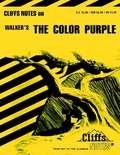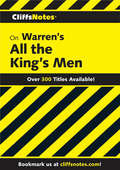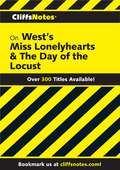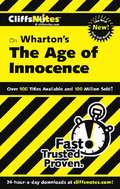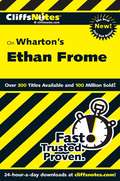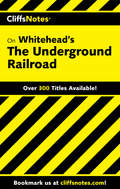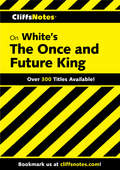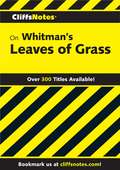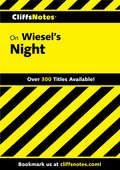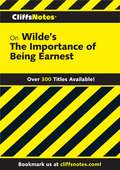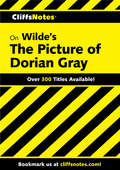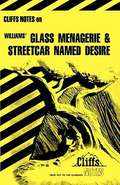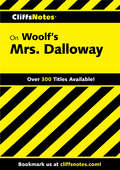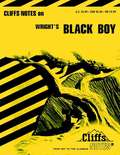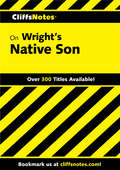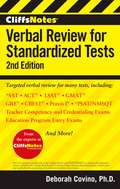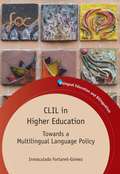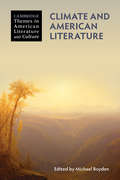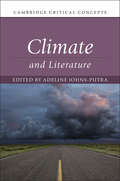- Table View
- List View
CliffsNotes on Walker's The Color Purple
by Gloria RoseThe original CliffsNotes study guides offer expert commentary on major themes, plots, characters, literary devices, and historical background.In CliffsNotes on The Color Purple, you follow the beautiful and difficult story of a shy and abused Southern black woman's struggle to create an identity, a feeling of self-worth, and love. Covering a series of personal letters that span a 40-year period, this study guide shares a story about growth, endurance, loyalty, solidarity, and joy -- all nurtured by the strength of love. You'll gain comfort with the black folk language main character Celie's uses to express herself as you move through critical commentaries on each of the novel's 89 letters. Other features that help you figure out this important work includeLife and background of the author, Alice WalkerAnalyses of a large cast of charactersIntroduction to the novelA review section that tests your knowledge and suggests essay topicsA selected bibliography that leads you to more great resourcesClassic literature or modern-day treasure -- you'll understand it all with expert information and insight from CliffsNotes study guides.
CliffsNotes on Warren's All the King's Men
by L. David AllenThis CliffsNotes guide includes everything you've come to expect from the trusted experts at CliffsNotes, including analysis of the most widely read literary works.
CliffsNotes on West’s Miss Lonelyhearts & The Day of the Locust
by Mordecai MarcusThe original CliffsNotes study guides offer expert commentary on major themes, plots, characters, literary devices, and historical background OCo all to help you gain greater insight into great works you're bound to study for school or pleasure. "CliffsNotes on West's Miss Lonelyhearts & The Day of the Locust" offers a close look at the painstaking craftsmanship of Nathanael West's two best novels, which provide material for engrossing entertainment and serious thought. Each of these books demonstrates West's incisive psychological and social probing into how society can crush or leave empty all who live in it. In this study guide, you'll find Life and Background of the Author, Introductions to the Novels, Lists of Characters, and more: Critical CommentariesCharacter AnalysesCritical EssaysEssay Topics and Review QuestionsSelected BibliographyClassic literature or modern-day treasure OCo you'll understand it all with expert information and insight from CliffsNotes study guides. "
CliffsNotes on Wharton's The Age of Innocence
by Susan Van KirkGet the most from great literature with CliffsNotes, the original study guides.Written exclusively by experienced teachers and educators, CliffsNotes are the resource of choice for today's students. These user-friendly guides make studying a snap - with visual icons flagging key themes, literary devices, and more.Inside you'll find valuable insights on Wharton's The Age of Innocence, including:Brief overall synopsisChapter-by-chapter summariesClear explanations and analysisCharacter map-who's who at a glanceCharacter analysis (Newland Archer, May Welland Archer, Countess Ellen Olenska, Mrs. Manson Mingott)Concise discussion of major themesSpecial essay on the book's themes, including personal freedom, values, and social codesReview Q&As and quote IDsEssay questions and practice projectsGlossaries of key words and terms
CliffsNotes on Wharton's Ethan Frome
by Suzanne PavlosThe original CliffsNotes study guides offer a look into key elements and ideas within classic works of literature. The latest generation of titles in this series also features glossaries and visual elements that complement the familiar format.CliffsNotes on Ethan Frome explores life in the personal prison designed by the lead character, a "ruin of a man" who would rather be miserable with his lot in life than stray from accepted social convention.Following the story of a poor farmer whose devotion to duty and fear of humiliation keep him from tasting happiness, this study guide provides summaries and commentaries for each chapter within this tragic tale. Other features that help you figure out this important work includeLife and background of author Edith WhartonIntroduction to the novel, with a synopsis and character mapFull character list and analyses of central figuresCritical essays on the author's style, choice of literary tools, and use of themesReview section that features fill-in-the-blank questions, quoted passages, essay questions, and suggested practice projectsResourceCenter with books, articles, and Web sites that can help round out your knowledgeClassic literature or modern-day treasure -- you'll understand it all with expert information and insight from CliffsNotes study guides.
CliffsNotes on Wharton's The House of Mirth
by Bruce E WalkerThe original CliffsNotes study guides offer expert commentary on major themes, plots, characters, literary devices, and historical background. The latest generation of titles in this series also feature glossaries and visual elements that complement the classic, familiar format.CliffsNotes on The House of Mirth takes you into the waning years of the Gilded Age and the moral bankruptcy of New York City's elite class. Edith Wharton's story of a woman — whose beauty causes men to desire to possess her and women to be jealous of her — reflects the complicated struggle of the individual against the social strictures of a powerful, and triumphant, moneyed class.This concise supplement to the satirically critical The House of Mirth, helps you understand the overall structure of the novel, actions and motivations of the characters, and the social and cultural perspectives of the author. Features that help you study includeChapter-by-chapter summaries and commentariesA character map that outline key characteristics and relationshipsInsightful character analysesA critical essay about the opulence and emptiness of the Gilded AgeA review section that tests your knowledgeClassic literature or modern modern-day treasure — you'll understand it all with expert information and insight from CliffsNotes study guides.
CliffsNotes on Whitehead's The Underground Railroad
by Gregory ColesCliffsNotes on Colson Whitehead's The Underground Railroad includes summaries and analyses of this 2016 National Book Award winning novel about the Underground Railroad and one slave's heroic struggle to gain her freedom via a "real" fictional Underground Railroad.
CliffsNotes on White's The Once and Future King
by Daniel MoranThe original CliffsNotes study guides offer expert commentary on major themes, plots, characters, literary devices, and historical background. The latest generation of titles in this series also feature glossaries and visual elements that complement the classic, familiar format.Based on medieval Arthurian legends, CliffsNotes on The Once and Future King is a twentieth-century version of young Arthur's quest for the sword Excalibur and his claim to the throne of England. Including many well-known and much-loved episodes with Merlyn, the sorcerer; Morgan La Fay, the witch; and knights jousting and hounds engaged in the hunt, White's novel adds to the lore surrounding the person of King Arthur.This study guide covers all four volumes of The Once and Future King with special emphasis given to the most popular volume, The Sword in the Stone. Other features that help you study includeCharacter analyses of major playersPersonal background of the author, T.H. WhiteA critical essay on Arthurian filmsA review section that tests your knowledgeA Resource Center full of books, articles, and websitesClassic literature or modern-day treasure—you'll understand it all with expert information and insight from CliffsNotes study guides.
CliffsNotes on Whitman's Leaves of Grass
by V. A. ShahaneThis CliffsNotes guide includes everything you’ve come to expect from the trusted experts at CliffsNotes, including analysis of the most widely read literary works.
CliffsNotes on Wiesel's Night
by Maryam RiessThe original CliffsNotes study guides offer expert commentary on major themes, plots, characters, literary devices, and historical background.In CliffsNotes on Night, you follow the humanistic first-person account of a teenage boy's incarceration by the Nazi Secret Service in World War II; his experiences in the Auschwitz and Buchenwald death camps; and his struggle to find meaning among the horror.Covering little more than a year of the young narrator's life, this study guide shares a story about endurance, loyalty, and faith — all nurtured by the strength of love. Other features that help you figure out this important work includeLife and background of the author, Dr. Elie WieselA list of charactersA historical timeline of Nazi GermanyA review section that tests your knowledge and suggests essay topicsA selected bibliography that leads you to more great resourcesClassic literature or modern-day treasure — you'll understand it all with expert information and insight from CliffsNotes study guides.
CliffsNotes on Wilder's Our Town
by Gary K CareyThis CliffsNotes guide includes everything you’ve come to expect from the trusted experts at CliffsNotes, including analysis of the most widely read literary works.
CliffsNotes on Wilde's The Importance of Being Earnest
by Susan Van KirkThe original CliffsNotes study guides offer a look into critical elements and ideas within classic works of literature. The latest generation of titles in this series also feature glossaries and visual elements that complement the classic, familiar format. CliffsNotes on The Importance of Being Earnest offers a concise look at this Victorian farce, which tweaks the complacency and aristocratic attitudes prevalent among the wealthy upper class of the time. Hidden identities, fierce repartee, underlying passions, and surprises punctuate this lively play. This study guide shows, through its expert commentaries, just how three sets of lovers clear up mishap and misunderstandings and end up happily ever after. Other features that help you figure out this survey of Victorian social issues include:A close look at the author's life, which itself was rife with scandal and ruinSummaries and commentaries, act by actDescriptive character analysesA character map that reveal key relationshipsCritical essays on Victorian views on compassion, religion, marriage, and moreA review section that tests your knowledge, and suggested essay topics Classic literature or modern-day treasure—you'll understand it all with expert information and insight from CliffsNotes study guides.
CliffsNotes on Wilde's The Picture of Dorian Gray
by Stanley P BaldwinThe original CliffsNotes study guides offer expert commentary on major themes, plots, characters, literary devices, and historical background. The latest generation of titles in this series also feature glossaries and visual elements that complement the classic, familiar format.In CliffsNotes on The Picture of Dorian Gray, you explore Oscar Wilde’s great works about narcissism, rife with symbolism and classic themes. Here, you meet Dorian Gray and discover his secret pact with the devil to stay young and handsome, and the subsequent destruction of his soul.This study guide carefully walks you through Dorian’s story by providing summaries and critical analyses of each chapter of the novel. You'll also explore the life and background of the author, Oscar Wilde, and gain insight into how he came to write this novel. Other features that help you study includeA list of charactersGlossaries to define new and unfamiliar termsCritical essays about Oscar Wilde’s views and lifeA review section that tests your knowledgeA list of online resources for more studyClassic literature or modern-day treasure—you'll understand it all with expert information and insight from CliffsNotes study guides.
CliffsNotes on Williams' The Glass Menagerie & A Streetcar Named Desire
by James L RobertsThe original CliffsNotes study guides offer a look into key elements and ideas within classic works of literature.CliffsNotes on Glass Menagerie & Streetcar Named Desire explores two popular plays, both of which take place in the South and borrow heavily from author Tennessee Williams's own life experiences.Following stories marked by struggle among loved ones, this study guide provides summaries and critical commentaries for each scene within the works. Other features that help you figure out this important work includePersonal background on the playwrightIntroduction to and synopsis of the playsIn-depth analyses of the cast of charactersReview section that features interactive quizzes and suggested essay topicsSelected bibliographies for both playsClassic literature or modern-day treasure -- you'll understand it all with expert information and insight from CliffsNotes study guides.
CliffsNotes on Williams' The Glass Menagerie and A Streetcar Named Desire
by James L. RobertsThe original CliffsNotes study guides offer a look into key elements and ideas within classic works of literature. CliffsNotes on Glass Menagerie & Streetcar Named Desire explores two popular plays, both of which take place in the South and borrow heavily from author Tennessee Williams's own life experiences. Following stories marked by struggle among loved ones, this study guide provides summaries and critical commentaries for each scene within the works. Other features that help you figure out this important work include Personal background on the playwright Introduction to and synopsis of the plays In-depth analyses of the cast of characters Review section that features interactive quizzes and suggested essay topics Selected bibliographies for both playsClassic literature or modern-day treasure - you'll understand it all with expert information and insight from CliffsNotes study guides.
CliffsNotes on Woolf's Mrs. Dalloway
by Gary K CareyThe original CliffsNotes study guides offer expert commentary on major themes, plots, characters, literary devices, and historical background. The latest generation of titles in this series also feature glossaries and visual elements that complement the classic, familiar format.In CliffsNotes on Mrs. Dalloway, you explore one of Virginia Woolf’s greatest works, which is about life, love, friendship, and acceptance. Here, you meet Clarissa Dalloway as she’s preparing for a party she will host that evening; and Septimus Smith, a shell-shocked war veteran struggling with the aftereffects of going to battle.This study guide carefully walks you through every step of a day in the life of Clarissa and Septimus by providing summaries and critical analyses of each chapter of the novel. You'll also explore the life and background of the author, Virginia Woolf, and gain insight into how she came to write Mrs. Dalloway. Other features that help you study includeA list of charactersCharacter analyses of Clarissa and SeptimusA review section that tests your knowledgeA bibliography for more studyClassic literature or modern-day treasure—you'll understand it all with expert information and insight from CliffsNotes study guides.
CliffsNotes on Wright's Black Boy
by Carl SennaThe original CliffsNotes study guides offer expert commentary on major themes, plots, characters, literary devices, and historical background.CliffsNotes on Black Boy chronicles the alienation of the author - not only from white society, but from his own people. Richard Wright's novel is a cry of anguish in the face of the human condition and the tragedy that comes when an individual struggles to overcome it.With this study guide, you'll experience the events and the unique tone of the novel. Background about the life of the author will help shed light on the novel's themes. Other features that help you study includeCharacter analyses of major playersChapter summaries and commentariesCritical essaysCharacter genealogy chartHelpful mapsReview questions and suggested essay topicsClassic literature or modern modern-day treasure -- you'll understand it all with expert information and insight from CliffsNotes study guides.
CliffsNotes on Wright's Native Son
by Lola AmisCliffsNotes on Richard Wright's Native Son, including life and background of the author, list of characters, critical commentaries, character analyses, essay topics and review questions, and selected bibliography.
CliffsNotes on Zola's Nana
by James L RobertsThis CliffsNotes guide includes everything you’ve come to expect from the trusted experts at CliffsNotes, including analysis of the most widely read literary works.
CliffsNotes Verbal Review for Standardized Tests (2nd Edition)
by Deborah Covino William A. Covino Peter Z. OrtonThis book provides an excellent and extensive overview of important information and the tools necessary for comprehensive verbal skills preparation.
CliffsNotes Vonnegut's Major Works
by Thomas R. HollandKurt Vonnegut takes on many aspects of life and America, science and fantasy. He points a camera at society and individuals, obscures certain elements of narrative device, and then reveals a twisted, yet recognizable picture.
CLIL in Higher Education
by Inmaculada Fortanet-GomezThis book offers a unique view of multilingualism in higher education from a global perspective. It presents a contextualised case of a multilingual language policy which takes the Content and Language Integrated Learning (CLIL) approach. The volume discusses various approaches to multilingual education including CLIL and then proposes guidelines for a multilingual language policy for Universitat Jaume I in Castelló, Spain. It examines the advantages of a multilingual education programme and reviews the success of existing language policies. This book will be an essential resource for researchers and students as well as policy makers.
Climate and American Literature (Cambridge Themes in American Literature and Culture)
by Michael BoydenClimate has infused the literary history of the United States, from the writings of explorers and conquerors, over early national celebrations of the American climate, to the flowering of romantic nature writing. This volume traces this complex semantic history in American thought and literature to examine rhetorical and philosophical discourses that continue to propel and constrain American climate perceptions today. It explores how American literature from its inception up until the present engages with the climate, both real and perceived. Climate and American Literature attends to the central place that the climate has historically occupied in virtually all aspects of American life, from public health and medicine, over the organization of the political system and the public sphere, to the culture of sensibility, aesthetics and literary culture. It details American inflections of climate perceptions over time to offer revealing new perspectives on one of the most pressing issues of our time.
Climate and Literature (Cambridge Critical Concepts)
by Adeline Johns-PutraLeading scholars examine the history of climate and literature. Essays analyse this history in terms of the contrasts between literary and climatological time, and between literal and literary atmosphere, before addressing textual representations of climate in seasons poetry, classical Greek literature, medieval Icelandic and Greenlandic sagas, and Shakespearean theatre. Beyond this, the effect of Enlightenment understandings of climate on literature are explored in Romantic poetry, North American settler literature, the novels of empire, Victorian and modernist fiction, science fiction, and Nordic noir or crime fiction. Finally, the volume addresses recent literary framings of climate in the Anthropocene, charting the rise of the climate change novel, the spectre of extinction in the contemporary cultural imagination, and the relationship between climate criticism and nuclear criticism. Together, the essays in this volume outline the discursive dimensions of climate. Climate is as old as human civilisation, as old as all attempts to apprehend and describe patterns in the weather. Because climate is weather documented, it necessarily possesses an intimate relationship with language, and through language, to literature. This volume challenges the idea that climate belongs to the realm of science and is separate from literature and the realm of the imagination.
